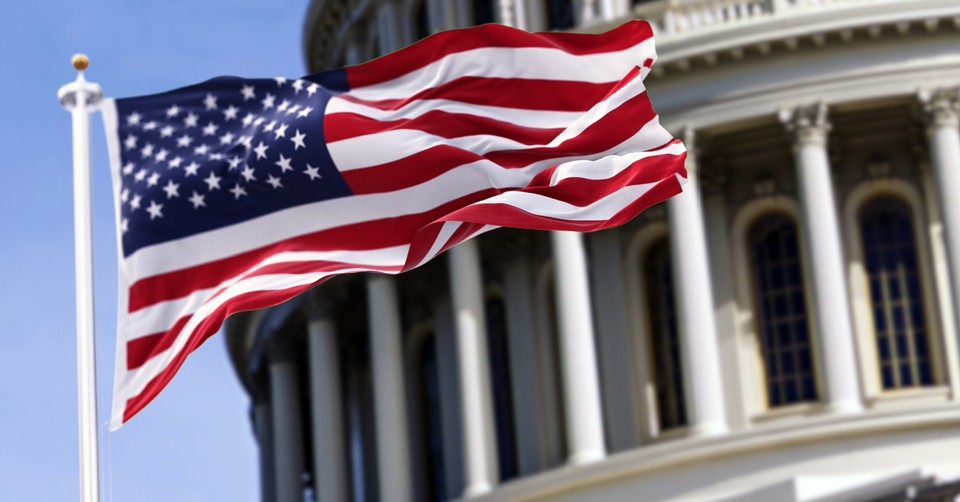9 Steps to Praying for Our Country

What are your views on patriotism? For many in our country, patriotism has gone out of style. Even many Christians protest the coupling of love of God and love of country. And this may be with good reason. Sometimes we confuse the priorities of heavenly and earthly citizenship.
But there's no doubt God wants us to be excellent citizens of our country. Righteousness exalts a nation, but sin is a disgrace to any people (Proverbs 14:34). This verse gives right living as one action we can take to be good citizens. In 1 Timothy 2:1-2, Paul exhorts us to pray as well. Nehemiah in the Bible provides a prayer pattern with nine steps to praying for our country in today's troubled times.
Before we analyze Nehemiah's response to his national crisis, let's review the context. Nehemiah, a Jew, lived and worked in the country of Babylon. The reason? Rebellion provoked God's discipline and ultimately led to the capture and exile of the Jews to Babylon. Now God, in His mercy, had allowed some of His people to return to Jerusalem, Judah's capital. But those who returned to the homeland did not rebuild the city, the temple, or even the city's walls for protection.
A report from Jerusalem came to Nehemiah:
And they said to me, "The remnant there in the province who survived the captivity are in great distress and reproach, and the wall of Jerusalem is broken down and its gates are burned with fire" (Nehemiah 1:3).
The sorry state of the city was indicative of the pitiful spiritual state of the people who lived there. Nehemiah's heart broke for his people. He didn't know them personally, but they were fellow citizens of the same country. Patriotism for his country and compassion for his people swept over Nehemiah. Now let's see what we learn from Nehemiah's response to this situation. His actions, with a prayer sandwiched between, are found in Nehemiah 1:4-11. These verses reveal nine steps, all beginning with "R," which provides a pattern for prayer we can follow as we intervene for our own country.
1. Rend your heart.
Now it came about when I heard those words, I sat down and wept and mourned for days (4a).
In those days, it was the custom for a mourner to tear his clothing, don sackcloth, dust with ashes, and wail. Nehemiah did all that to symbolize his torn heart, his inner mourning. The news of his people being defenseless against enemies grieved him.
In the same way, we must allow God to shatter our hearts for the precarious state of our country. There is much talk right now about defenseless physical borders, but a lack of spiritual boundary lines dwarfs the border problems. How much more vulnerable are the minds and hearts of generations of people floundering with no biblical foundation?
2. Remove fleshly distractions.
And I was fasting and praying before the God of heaven (4b).
Nehemiah rejected food for a time to pour himself into connecting with God. Fasting humbled Nehemiah, driving home his desperate need for God. He used the time without physical sustenance to receive the spiritual nourishment he craved. Fasting heightened Nehemiah's spiritual perceptions of reality.
Perhaps you haven't much practiced the discipline of fasting. In a world where food is so readily available, we don't appreciate our complete dependency on God. Why not set aside a time when you deprive yourself of food and discover a deeper connection with God?
3. Remember the character of God.
I said, "I beseech You, O Lord God of heaven, the great and awesome God, who preserves the covenant and lovingkindness for those who love Him and keep His commandments (1:5 NASB1995).
While Nehemiah fasted, he prayed. Not to just anyone. Nehemiah prayed to the only One with the ability to make the impossible happen. His prayer began with a declaration of who God is, His character, and His deeds. It is the equivalent of "hallowed by Thy name" in the Lord's prayer (Matthew 6:9). After praising God's might and majesty, Nehemiah moves to the promise-keeping and law-giving nature of God.
Nehemiah wraps this part of his prayer in the security blanket of God's lovingkindness. The concept melds God's sympathy, compassion, goodness, and mercy toward undeserving people into one amazing word. Likewise, as we pray for our country, we must claim God's lovingkindness as our only hope.
4. Recognize that God has no obligation to listen to you.
Let Your ear now be attentive and Your eyes open, to hear the prayer of Your servant… (6a).
After extolling God's greatness, Nehemiah understands that God has no need to incline Himself to humankind, yet He graciously does (Psalm 8:4). That's why Nehemiah next humbly asks God to listen and respond to his plea.
Though I believe God has blessed our nation from the beginning for His purposes, Americans have no special status with God. Our founding fathers, many of them depending on God's wisdom, had noble intent. But our nation has strayed far from God's principles. We have done nothing to deserve God's ear. Yet we may humbly ask God to take notice of our requests.
5. Repeat your petitions to God.
…which I am praying before You now, day and night, on behalf of the sons of Israel Your servants… (6b).
Like the persistent widow in Jesus' parable found in Luke 18, Nehemiah persevered in prayer to God. According to this verse, he prayed continually, day and night, for his people. People he did not know were living in a land he had never seen. Yet, with a heavy heart, he labored in prayer for them.
Our country is steeped in conflict; groups pitted against one another. Divisive rhetoric abounds. Our negative emotions can harden our hearts toward people we should care about. Saying a prayer for "the other half" of the country is the last thing we feel like doing. Yet shouldn't we, like Nehemiah, persistently and passionately stand in the gap for these people and our country's future?
6. Repent of the sins of your country.
…confessing the sins of the sons of Israel which we have committed against You; I and my father's house have sinned. We have acted very corruptly against You and have not kept the commandments, nor the statutes, nor the ordinances which You commanded Your servant Moses (6c-7).
Nehemiah didn't sugarcoat the situation. He knew as well as anyone the rebellion of his people. That's why he and so many others were born and living in Babylon instead of their native land. Instead, he truthfully acknowledged the dreadful extent of their sin. But then he went a step further. He personally identified himself as a fellow sinner. He took responsibility before God for his own sins and his country's sins.
Isn't it always easier to pray about the sins of someone else? The ones that don't hit close to home glibly roll off our tongue. But as citizens of the United States, we must own national sins. We cannot blame our leaders. The faults of our leaders reflect the hearts of citizens who elect them. Taking responsibility for sin as my own has broken my heart, but it has also added depth and authenticity to my prayers.
7. Remind God of His promises.
Remember, please, the word which You commanded Your servant Moses, saying, 'If you are unfaithful, I will scatter you among the peoples; but if you return to Me and keep My commandments and do them, though those of you who have been scattered were in the most remote part of the heavens, I will gather them from there and bring them to the place where I have chosen to have My name dwell.' (8-9)
In truth, God does not need to be reminded about His promises. The reminding we do in prayer is for our benefit. Nehemiah knew God's promises and restated them back to God to inject hope into his broken heart.
Before asking God for anything, we should become aware of God's promises. It helps us to connect our requests to God's will. This is key to receiving God's blessing. God hasn't explicitly mentioned our country and its outcome in His Word. But he has given general if-then promises for nations and people. Let's pray God's promises for America without inserting our agenda.
8. Request God's provision for your need.
They are Your servants and Your people whom You redeemed by Your great power and by Your strong hand. Please, Lord, may Your ear be attentive to the prayer of Your servant and the prayer of Your servants who delight to revere Your name, and please make Your servant successful today and grant him mercy before this man." (10-11)
Nehemiah finally asked God for something—success and mercy. But he left the definition of success up to God. His request was the smallest portion of his prayer because he trusted God to act in the best way.
Likewise, we need not dictate to God how to provide or correct our country's problems. We simply ask, relying on His wisdom and commitment to His eternal plan.
9. Risk Taking action.
Implied in the last sentence of this prayer is an action that Nehemiah planned to take. The man to whom he refers is the king. Nehemiah risked his life by asking the king to allow him to help his people. His faith compelled him to act. You can read the remaining chapters of Nehemiah, which demonstrate how God powerfully responded to Nehemiah's prayer.
Perhaps God is prompting you to risk something based on these nine steps to praying for our country. Will you step out in faith? May our prayers always conclude with a willingness to act as God's instrument.
*All verses are taken from the NASB version of the Bible unless otherwise noted.

Related Resource: Strengthening Your Marriage While Raising a Child with Disabilities
In this episode of Empowering Homeschool Conversations, your host Annie Yorty and her special guests dive into the unique challenges and beautiful complexities of maintaining a strong, loving partnership while navigating the demands of special needs parenting. Our expert guests bring a wealth of knowledge and personal experience to the table, offering invaluable insights and practical strategies for fostering resilience, connection, and joy in your marriage. Whether you're homeschooling parents seeking support, or simply looking for ways to strengthen your relationship amidst life's challenges, this conversation promises to provide the inspiration and tools you need to thrive together. Listen now!
This article is part of our Prayer resource meant to inspire and encourage your prayer life when you face uncertain times. Visit our most popular prayers if you are wondering how to pray or what to pray. Remember, the Holy Spirit intercedes for us, and God knows your heart even if you can't find the words to pray.
The Lord’s Prayer
Prayer for Peace
Morning Prayers
Good Night Prayers
Prayer for Healing
Prayer for Protection
Prayer for Anxiety
Prayer for Strength
Now available is our new Daily Prayer devotional and podcast! An easy way to start your day with prayer: read or listen to today’s prayer and sign up to receive it by email.
Originally published February 14, 2022.








